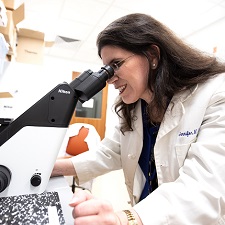Jennifer M. Kalish, MD, PhD
Jennifer M. Kalish, MD, PhD

Dr. Kalish is studying a rare hereditary syndrome called Beckwith-Wiedemann syndrome (BWS), which increases the risk of children developing kidney and liver cancers. These individuals have epigenetic changes on chromosome 11 that are found in other types of cancers. Epigenetic markers modify DNA so gene expression is turned on or off; changes in this process can cause cancer. By understanding how cancer is triggered in BWS, Dr. Kalish aims to identify pathways that can be targeted for the development of new treatments both for BWS patients and for others with cancers that have similar epigenetic changes. As a physician-scientist, Dr. Kalish established the BWS Registry, which compiles both clinical data and patient samples, and created the first human cell-based models of BWS.
